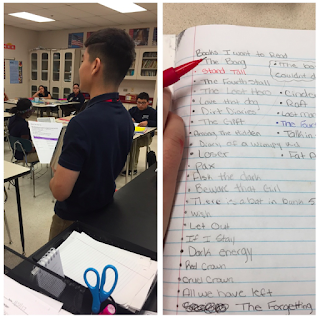10 minutes: Do Now
Students start the day by working on a Vocabulary as a Do Now. Our building has created school-wide vocabulary lists, so as as they study words for the week, I take attendance and status of the class, pass back work, and answer any burning questions they might have.
2-3 minutes: Book talk
First quarter, I gave a book talk each day. Now that students are used to it, each day, one of them delivers the book talk. My students keep a "books I want to read" list in the front of their notebooks, so the goal here (as advised by Penny Kittle) is for kids to have books on deck, so when they finish a book, they know what is coming next.
10-15 minutes: Silent Reading
If you want students to read at home (I do, their homework is 20 pages a night) then you have to dedicate time in your class (preferably every day) so that they can read. These minutes are not free time for me. Now that kids are in a habit, I can confer with students about their books, but this time is also used for anecdotal observations. When kids are reading at home, they can easily get into their books for 10-15 minutes at a time in class, and quickly. Since I take status of the class, I know who is beginning a book, in the middle of a book, has finished a book and is writing a book blog, or who is spending time selecting books. There are no longer days when kids are wandering, swapping books every day, or forgetting books at home or in their lockers. These 10 or 15 minutes along with status of the class and conferring sends a message: In this class we read and finish books.
5-10 minutes: Poetry
Tiny packages full of big ideas. With poetry, kids are forced to peel back layers of meaning and determine what the poet is *really about. Additionally, it's time for me to read aloud to them on a daily basis, time for them to practice oral reading with a peer (after I read the poem to them, they read it with the person sitting next to them), time to determine meaning of unknown words, and time to be blown away by what poetry can do. Yesterday I showed them my favorite spoke word poem, Poet, Breath Now. I get chills every time I hear this poem. They listened, then they were give a copy of the text. Because they are used to reading poems with a peer or choral reading as a class, many of them were reading the poem aloud with the author the second time. After the reading and uncovering meaning, we then "say something" about the poem, what it might actually be about, what we're confused about, if we like or dislike it. This discussion part is still a work in progress, but with consistency, I'm hoping it continues to improve.
I usually share two poems each week, but in the case of Poet Breath Now, we'll probably spend a whole week uncovering meaning.
10-15 minutes: Mini-Lesson
Next we move into workshop. Mini-lessons are just brief teacher demonstration and direct teaching about a topic we are currently working on. This past week, we were reading argument articles and my mini-lessons included:
- Vocabulary instruction on argument terms (claim, evidence, statistics, testimony, anecdotes, elaboration, counterargument)
- How to do note-taking with argument articles (list claim, evidence, counterargument, and then tell if you think the argument is weak or strong)
- How to locate evidence (look for key words: researchers, studies, universities, journals, scientists, etc)
- Revision on argument note-taking: Instead of writing the claim first (How can you even do that if you haven't read the text?) list all the evidence first, then think about the claim and counter argument at the end.
- How to make evidence mirror the claim - I had noticed some kids were listing evidence that was irrelevant to the claim they were hoping to cite, so we practiced sorting some evidence and deciding that if it doesn't necessarily fit with the claim you're thinking, you should throw it out
- Remembering that not all of an argument article is just evidence, some of it is elaboration, too!
I am currently not working with a Calkins unit - middle school only has the writing units so far (they are writing the reading units, now, fingers crossed!) So, you might be wondering where I come up with the ideas for mini-lesson. It's all in the workshop and conferring!
20-35 minutes: Workshop
During workshop, kids do the work of the day...remember, whoever is doing the work is doing the learning! Each day last week during workshop, a group of students meet with me and another group meet with my co-teacher. Students who are left work independently, but because of my low numbers and two teachers, kids are lucky to see an adult every other day:
 |
| Conferring schedule - I have four different ones that alternate every day. |
So kids come to confer with me. Sometimes I confer one at a time with the four or five kiddos seated with me and sometimes we work as a group. But through these conferences or group work, misconceptions about what we're doing really stand out, and I'm able to do some note-taking of my own, which informs my instruction. And even better than finding misconceptions, is when kids share ideas about their thinking that are even better than my own thinking. This week, as we were talking about evidence from an article, one kiddo said, "Well this sounds like it's going to be evidence to support the counterclaim, so should we write it at the end of our notes?" Such brilliant thinking!
I think many times, us adults are limited in our thinking, we're not as free and creative as kids are because we've been around longer. I would have never been able to draft the set of mini-lessons I delivered without the kids working at my side.
I'm lucky also to have some alternative seating, so the independent kids are free to move around and work together, after all, there's really 20 teachers in the classroom, not just the two adults.
3-5 minutes (or 1 minute if I'm being honest): Share Time, exit slip, homework
I need to be better at share time. It's so important for kids to share the work they did, but many days the time slips by and we, in a hurry, just get the homework out. (Homework is always the same - read 20 pages and write two blog posts a week.)
Some caveats
- On Mondays, my schedule is different. On Mondays, they have more time to read independently, like 20 or 25, and my mini-lesson is always focused on blogging. Again, I can't expect kids to write two blogs a week if I don't give them any time in class to accomplish this work.
- In order to accomplish Reading & Writing Workshop, I teach them by weeks. We just spent a week in Reading Workshop reading argument articles. Next week, we will switch to Writing Workshop and write argument papers. To me, this makes the most sense and flows best.
- Sometimes poetry time get absorbed into other things we have going on, but I try my best to share at least one poem a week.
- Sometimes I get stuck in a rut and don't even realize it until I visit classrooms of my colleagues, like my Vocabulary Do Nows - I've had them doing this work in their notebooks, but then I was just in a room and they have them on google slides. Making that change on Monday, don't know why I was missing that. This is one of many reasons it's so important to visit classrooms of your colleagues! (Check out the Pineapple Chart on this post if you're unfamiliar.)
- Sometimes kids don't want to come work with me in our group during workshop. In this instance I pick my battles - if they conferred with me recently and are doing well, I'll let them work independently.
- On the other hand, sometimes kids are not on my conferring list and *ask to come join our group. This is awesome when it happens, but I also want to build their sense of independence, too.
- Sometimes it's an off day - either I'm off with some anxieties unrelated to ELA or the kids are off for a multitude of reasons. Once in awhile you could stop by my room and I'm not conferring and kids are not working together. We're human and this happens at times, I'm not going to sweat it though. I teach in real life ELA, not a perfected version of reading and writing.
So that's my day! It's taken me about 5 months to get the routine going, but I think it's effective for the kiddos and me! What about you? Are you block scheduled? How is your pacing similar to or different from mine?
Happy Weekend!


























I love reading about your day, and I'm just a little jealous about the amount of time you have. :) My classes are 55 minutes, so we have a little less flexibility. I agree that we learn more when we share and watch others -- and the person doing the work is the one learning. Thank you for sharing!
ReplyDeleteWhat a great day! And real life. I like that. I teach in real life also. Good to be in great company!
ReplyDeleteAlyce